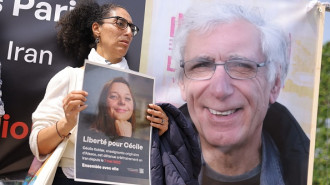IS claim Germany axe attacker was their 'soldier'
The Islamic State group has released a video showing the man it says is the Afghan refugee who carried out an axe and knife attack in Germany.
The group described the 17-year-old as a "soldier of the caliphate".
IS-linked Amaq news agency said the Afghan man attacked passengers on a train in Germany on their behalf, in a horrific assault which left four members of a family from Hong Kong seriously injured.
The man - who was shot dead by police - spoke Pashtu in the video and said he would carry out an "attack" and threatening "infidel" countries.
Police found an IS flag in his home, while he had the group's banner painted on his hand.
The video showed the attacker named as Mohammed Riyadh - a refugee from Afghanistan - speaking Pashto with Arabic subtitles.
Amaq media had earlier said that IS were behind the attacks.
"The perpetrator of the stabbing attack in Germany was one of the fighters of the Islamic State," the Amaq news agency said, citing a "security source".
"He carried out this operation responding to calls to target countries of the coalition fighting IS," it added, referring to the US-led coalition targeting the extremist group in Syria and Iraq.
Attack
The attack on a train near the southern city of Wuerzberg appeared to be the first time IS has claimed an attack in Germany.
The attacker had arrived in Germany as an unaccompanied minor and was staying with a foster family in the region.
His rampage seriously wounded four members of a family from Hong Kong, two of whom were in critical condition.
Twitter Post
|
Witnesses said the interior of the train was covered with blood and looked "like a slaughterhouse", the German news agency DPA reported. About 30 passengers were on the train at the time; more than a dozen were treated for shock.
The assailant was killed as he tried to flee, authorities in Germany said.German authorities said the attack was likely extremist inspired.
"It is quite probable that this was an Islamist attack," said a ministry spokesman, adding that the assailant had shouted "Allahu akbar" (God is greatest).
IS has regularly urged followers to target "disbelievers", with its spokesman Abu Mohamed al-Adnani in September 2014 calling on supporters to use stones, knives or vehicles as weapons.
Though IS claimed responsibility through its news agency, state Interior Minister Joachim Herrmann said the suspect had written notes in his native Pashto that indicated he may have been self-radicalised and there was "no indication" he was directly connected to the extremist group.
People close to the attacker told investigators he had seemed like a calm person, not overtly religious or an extremist, Herrmann added.
Investigators are still looking into the evidence found in the teenager's room, he said, adding it could be possible that the notes included a farewell letter to his father.
"There are hints that he - in a text - writes about the lives of Muslims, but also that Muslims must take action on their own and resist now," Herrmann said.
Herrmann said that it was too early to draw conclusions about the attacker's motive.




 Follow the Middle East's top stories in English at The New Arab on Google News
Follow the Middle East's top stories in English at The New Arab on Google News

![The law could be enforced against teachers without prior notice [Getty]](/sites/default/files/styles/image_330x185/public/2178740715.jpeg?h=a5f2f23a&itok=xMdFOAIF)
